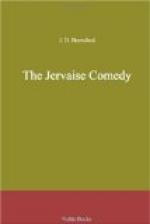“Is the car in the garage? Your own car?” he asked.
“Yes. Rather. Of course,” Jervaise replied uneasily.
“You’ve just looked?” Hughes insisted.
“I know the car’s there,” was Jervaise’s huffy evasion, and he took Ronnie by the arm and led him off into the drawing-room.
The Hall door stood wide open, and the tragedy of the night flowed unimpeded through the house.
Although the horror had not been named we all recognised its finality. We began to break up our formation immediately, gabbling tactful irrelevancies about the delightful evening, the delinquent Carter, and the foolishness of Sabbatarianism. Mrs. Atkinson appeared in the Hall, cloaked and muffled, and beckoned to her three replicas. She announced that their omnibus was “just coming round.”
In the general downward drift of dispersion I saw Grace Tattersall looking up at me with an expression that suggested a desire for the confidential discussion of scandal, and I hastily whispered to Hughes that we might go to the extemporised buffet in the supper-room and get a whisky and seltzer or something. He agreed with an alacrity that I welcomed at the time, but regret, now, because our retirement into duologue took us out of the important movement, and I missed one or two essentials of the development.
The truth is that we were all overcome at the moment by an irresistible desire to appear tactful. We wanted to show the Jervaises that we had not suspected anything, or that if we had, we didn’t mind in the least, and it certainly wasn’t their fault. Nevertheless, I saw no reason why in the privacy of the supper-room—we had the place to ourselves—I should not talk to Hughes. I had never before that afternoon met any of the Jervaise family except Frank, and on one or two occasions his younger brother who was in the army and, now, in India; and I thought that this was an appropriate occasion to improve my knowledge. I understood that Hughes was an old friend of the family.
He may have been, although the fact did not appear in his conversation; for I discovered almost immediately that he was, either by nature or by reason of his legal training, cursed with a procrastinating gift of diplomacy.
“Awkward affair!” I began as soon as we had got our whiskies and lighted cigarettes.
Hughes drank with a careful slowness, put his glass down with superfluous accuracy, and then after another instant of tremendous deliberation, said, “What is?”
“Well, this,” I returned gravely.
“Meaning?” he asked judicially.
“Of course it may be too soon to draw an inference,” I said.
“Especially with no facts to draw them from,” he added.
“All the same,” I went on boldly, “it looks horribly suspicious.”
“What does?”
I began to lose patience with him. “I’m not suggesting that the Sturtons’ man from the Royal Oak has been murdered,” I said.




